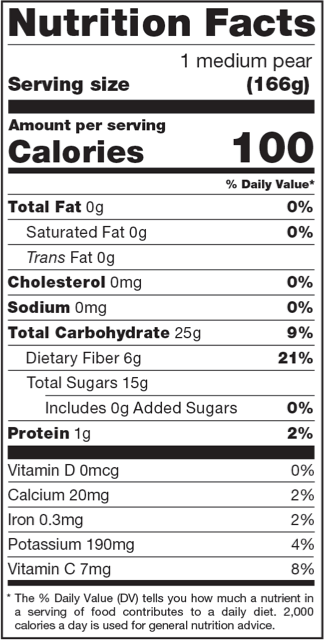
Pears pack a nutritional punch!
A medium sized pear (about 166 grams) is a nutrient-dense food that contains only 100 calories, and is fat free. A nutrient-dense food is any food that provides vital nutrients (such as vitamins and minerals), but relatively few calories. Nutrient-dense foods are also usually higher in fiber and water, components that tend to make us feel full faster and for longer.
is fat free. A nutrient-dense food is any food that provides vital nutrients (such as vitamins and minerals), but relatively few calories. Nutrient-dense foods are also usually higher in fiber and water, components that tend to make us feel full faster and for longer.
Pears are nutrient-dense and an excellent source of fiber. One medium pear provides 6 grams of fiber, which is about 21% of the Daily Value, and can help you feel satisfied longer between meals and snacks. According to the Dietary Guidelines for Americans, the average American adult should consume approximately 2 cups of fruit per day. One medium-sized pear is approximately one cup, so you’re halfway there with just one pear!
Breakfast is the most important meal of the day—start the day off right with this nutrient-dense Pear Granola Bread.
Pears are an excellent source of Fiber!
Pears are one of the leading fruit sources of fiber. A medium-sized pear packs 6 grams of fiber, which equals about 21% of the recommended daily value. The skin contains the majority of the fiber found in a pear, so enjoy the skin for added flavor, texture, and nutrients.
Fiber is a type of carbohydrate called a complex carbohydrate. Did you know that our bodies cannot digest fiber and it doesn’t contain any calories? The very fact that we can’t digest fiber is what makes it so important for our health. Fiber acts like a sponge as it travels through our digestive system, absorbing water and removing waste and toxins. According to the Dietary Reference Intakes* (DRIs), a reference for recommended and adequate intakes of particular nutrients, most American adults should consume between 21 and 38 grams of fiber per day, depending on age and gender.
There are two basic types of fiber that compose dietary fiber. Soluble fiber absorbs water and softens stool; this type of fiber also helps reduce cholesterol. Insoluble fiber helps to bulk the stool for easier passage through the intestines. Diets low in saturated fat and cholesterol and rich in fruits, vegetables, and whole grains that contain fiber, particularly soluble fiber, may reduce the risk for heart disease, a disease associated with many factors. Low fat diets rich in fiber-containing grain products, fruits, and vegetables may also reduce the risk of some types of cancer, a disease associated with many factors.
Check out this delicious Creamy Pear and Coconut Smoothie which not only provides fiber, but also vitamin C and calcium. Be sure to leave the skin on as that contains the majority of the fiber!
* Dietary Reference Intakes as recommended by the National Academy of Sciences.